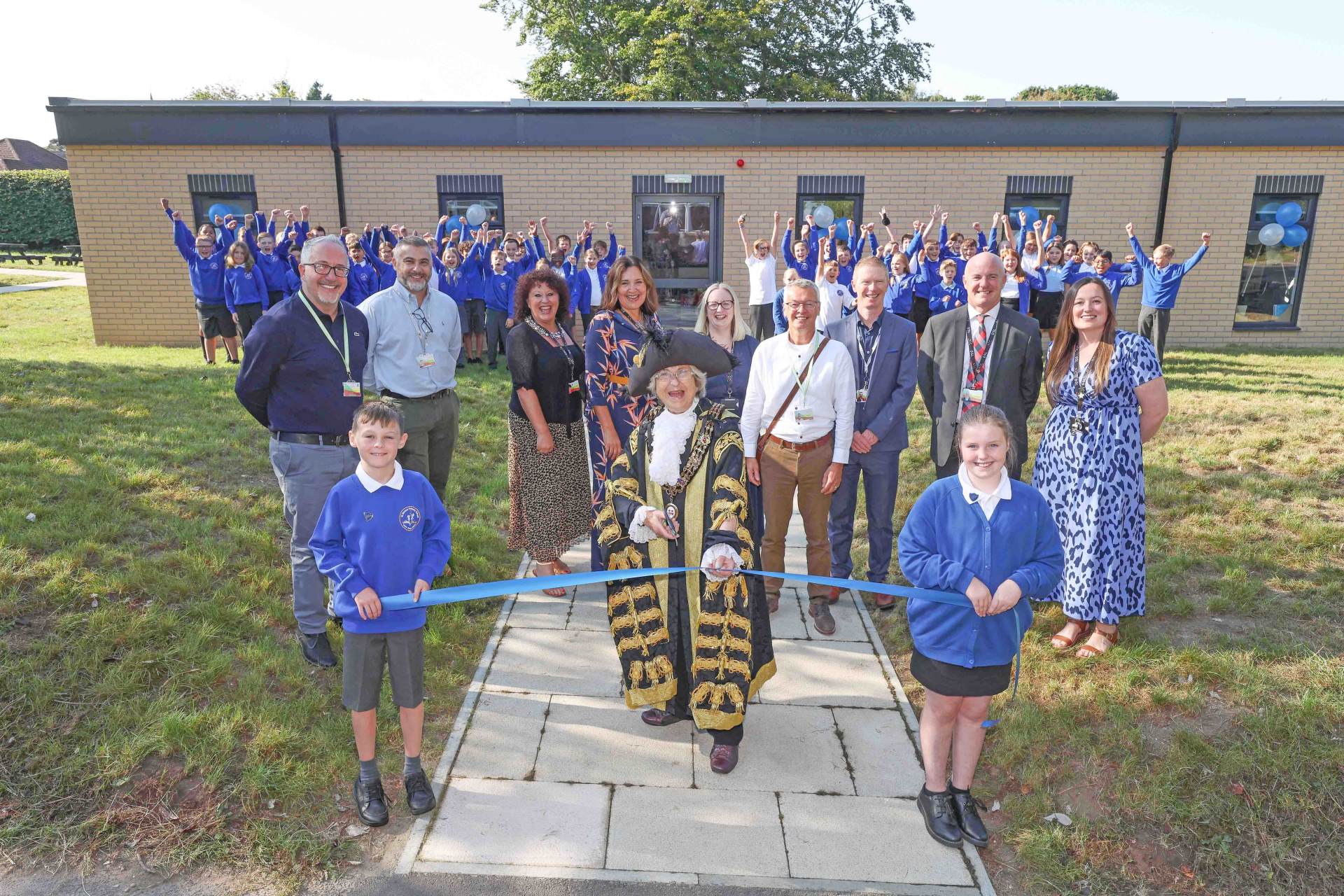Daily Echo Article - Challenge Partners Report 2024
On Monday 29th April 2024 the below article will be published in the local newspaper "The Daily Echo." The report will showcase our most recent report from our Challenge Partners visit in March 2024.
Praise for St Monica Primary School with Challenge Partners’ quality assurance feedback
 CLASS ACT: Pupils and staff at St Monica Primary School, at the grand opening last September of the newly redeveloped school on one site. The school has been praised for a second consecutive year in a quality assurance review by a national education charity, having converted to an academy with Inspire Learning Partnership in April 2022.
CLASS ACT: Pupils and staff at St Monica Primary School, at the grand opening last September of the newly redeveloped school on one site. The school has been praised for a second consecutive year in a quality assurance review by a national education charity, having converted to an academy with Inspire Learning Partnership in April 2022.
St Monica Primary School praised by Challenge Partners | Daily Echo
St Monica Primary School has been praised for second consecutive year by a national education charity which shares leading practice in classrooms.
Challenge Partners, an organisation encouraging schools to work together to make educational improvements, carried out the latest annual quality assurance review at the school’s request.
It summed up: “As a result of the improved provision created by leaders and teachers across the school, academic outcomes are continuing to rise at St Monica.
“In 2023, pupils at the end of Key Stage 2 made significantly more progress in reading, writing and mathematics than their peers did nationally.”
Developmental
Lisa Marshall, Executive Principal of St Monica Primary School in Sholing and Kanes Hill Primary School in Thornhill, said: “The second annual review by Challenge Partners, which differs to Ofsted because the review is developmental rather than judgmental, shows St Monica continues to do the right things.
“The report stated leadership was ‘Effective’ at all levels and ‘Effective’ in the quality of provision and outcomes for pupils.
St Monica, along with Kanes Hill, is part of Inspire Learning Partnership which operates a number of schools across Southampton and Waterside area on the western side of Southampton Water.
Lisa added: “It is important that parents and carers know that staff and pupils are reflecting Inspire’s values of innovation, nurturing success, passion, integrity, responsibility and excellence.
Positive
“The latest review, again highlighting the many positive things we are doing to benefit the children’s education, is especially important to us because St Monica was previously split across two locations.
“Now, in this academic year, the school is on one site following a £3 million modernisation programme; the youngsters take pride in their new surroundings and the enhancements further lift aspirations and the strong sense of feeling valued. This has clearly benefited pupils.”
Lisa added: ““Having valued external feedback is essential so we can do even better for our pupils. Following constructive feedback, we continue to refine teaching strategies to close any gaps, with learnings shared across the Inspire family.”
The school’s redevelopment included upgraded facilities for Reception and Year 1 along with two classrooms for Year 6 in a new modular building separate to the main building.
Effective leadership
Claire Lowe, Chief Executive of Inspire Learning Partnership, said: “My colleagues and I are incredibly proud of what has been achieved at St Monica over the past two years since the school joined the Inspire family, with the investment in professional learning and the expert leadership of the school’s Executive Principal clearly making a positive difference to the children and staff. Challenge Partners’ latest quality assurance review is testament to that.”
Challenge Partners praised effective leadership at all levels at St Monica, which has 375 pupils.
Highlights in this area included an ‘open door policy’, working collegiately to secure continual development, working hard with families to develop trusting relationships, celebrating achievements with snippets newsletters and coaching reviews with middle leaders to help them drive developments in the curriculum.
Subject leaders have benefited from continuing professional development (CPD) and support from senior leaders. They also collaborate with external partners such as the local Maths Hub and the Primary Science Quality Mark.
Celebrating diversity
Leaders continue to “refine their broad and ambitious curriculum to ensure it is highly engaging and is contextually relevant for their community”.
For example, art and music subject leaders revised their curriculum areas to further celebrate and promote diversity; the school ensures that key vocabulary, knowledge and skills underpin curriculum design.
Knowledge organisers are used by pupils to help them remember what they have learnt previously.
Foundation subjects take an enquiry approach. Pupils progress throughout a learning journey leading them to answer ‘big questions’; they understand that learning over a series of lessons is being developed in order that they can apply it to challenging activities.
Nurturing approach
For example, in a Year 3 history lesson on the Romans, pupils excitedly explained how they thought their prior learning on Boudicca and Roman roads was going to help them when they reached their ‘end point’.
The review also stated that the “insightful, driven executive principal, supported by committed senior leaders, demonstrates a relentless, strategic yet nurturing approach to school improvement. She has helped colleagues to ensure they are focused on the impact of their leadership“.
Regarding the quality of teaching provision and outcomes, Challenge Partners wrote of “very strong” relationships between staff and pupils.
Pupils speak respectfully and enthusiastically about their teachers. They know that they care and want the best for them.
Respect and kindness
A Year 6 pupil, whilst proud of the recent significant redevelopment of the site, described that “It’s the people that make it perfect, not the building.”
A group of pupils in Key Stage 1 were able to explain how assemblies assisted them to understand how the school helps them to stay safe; leaders and staff spend time with pupils explicitly explaining how everyone should treat each other.
A Year 2 pupil said: “Respectful means listening to others and showing kindness.”
Pupils across the school demonstrate proactive learning behaviours. A group of pupils in Key Stage 2 talked about having a responsibility to “inspire each other by showing a positive learning attitude”.
Supported learning
Across Key Stage 1, pupils are supported by well-embedded learning routines in phonics which allow them to access the learning independently.
Pupils were actively learning in all parts of phonics lessons, including applying their knowledge to reading and writing. Pupils feel supported in their learning and safe to take risks. The calm, harmonious atmosphere gives pupils a sense of emotional security.
One Year 2 pupil commented: “If you make a mistake, you know you have tried your hardest and you learn from it.”
Reading importance
The school has a strong reading culture. Reading is celebrated through fun assemblies and World Book Day.
There has been a concerted focus by leaders to ensure that pupils are “reading as readers” and “reading as writers”.
Texts are at the centre of the English curriculum. Pupils are immersed in rich language which they then assimilate in their own writing.
One pupil said that reading was important as “that’s the way you learn”.
Thought provoking
Teachers prioritise the teaching of vocabulary; leaders have supported teachers to further develop challenge in lessons.
The pitch of learning has increased across the school. In a Year 3 writing lesson, The Misadventures of Frederick, the teacher’s use of thought-provoking questions led to pupils’ undertaking deeper thinking and choosing more adventurous vocabulary.
During a Year 2 session in mathematics on measure, pupils were expected to make connections to different concepts. They did so readily and solved problems involving reasoning.
Children receive a strong start to their schooling and benefit from responsive adults in Reception; they receive individualised and nuanced support to help them achieve their next steps in development.
Rock Steady
Challenge Partners also wrote of the quality of provision and outcomes for disadvantaged pupils and pupils with additional needs.
The school has a broad range of extra-curricular opportunities. For example, the Rock Steady club is popular with pupils; they have the chance to be in a rock band and perform to an audience of parents and pupils.
One Key Stage 2 pupil appreciated that pupils do not have to pay for enrichment activities “so nobody is disadvantaged”.
Leaders have facilitated a range of CPD based on inclusion, including related to meeting communication and interaction needs.
Positive relationships
The outward-facing SEND coordinator has forged positive relationships with agencies, charities and specialist services.
External expertise is shared with staff. Learning support assistants receive weekly training. Teachers receive CPD collectively or on an individual basis.
Approaches such as ‘colourful semantics’, ‘PECs’ and ‘Makaton’ are used widely to support pupils in accessing learning.
Vulnerable pupils have benefited. Many are now able to communicate better in all areas of school life and beyond.
Emotional literacy
CPD in emotional literacy has improved staff’s confidence to meet pupils’ social, emotional and mental health needs.
Fortnightly assemblies related to emotional literacy help all pupils, including those who are vulnerable, to identify and express their feelings.
The school has worked with a nationally renowned consultant on disadvantage to provide whole school CPD on equity and equality for all.
Leaders are unequivocal that meeting additional needs is ‘a golden thread’ that must run throughout all provision.
Mindful
Staff are mindful of the need to include every pupil in the universal offer so that all can benefit from inclusive resources and approaches.
The school has redeveloped their learning environments in conjunction with ‘Autism in Schools’ as part of the local authority’s inclusion partnership.
Environments are consistent.
Subject leaders review and proactively plan the curriculum to ensure their subjects are adapted for all vulnerable groups.
Improved access
For example, in design technology in Year 5, pupils sew as part of creating a puppet. This part of the curriculum is designed so alternative materials are provided, meaning those with additional needs can have improved access to the same learning as their peers.
Teachers use scaffolding to help all pupils be successful in learning. In a Year 4 lesson on the use of inference when reading The Boy At The Back of the Class, ‘Widgits’, stem sentences and writing frames helped some vulnerable pupils to gain a deeper understanding of the text.
The SEND coordinator has overseen the revision of approaches to assessment for pupils with significant needs that are working at pre-key stage.
The improved information allows leaders and teachers to better adapt provision for some of the most vulnerable pupils.
Further understanding
They now have further understanding of the smaller steps of progress being made.
In mathematics, this has helped the further tailoring of curriculum design in relation to addition.


